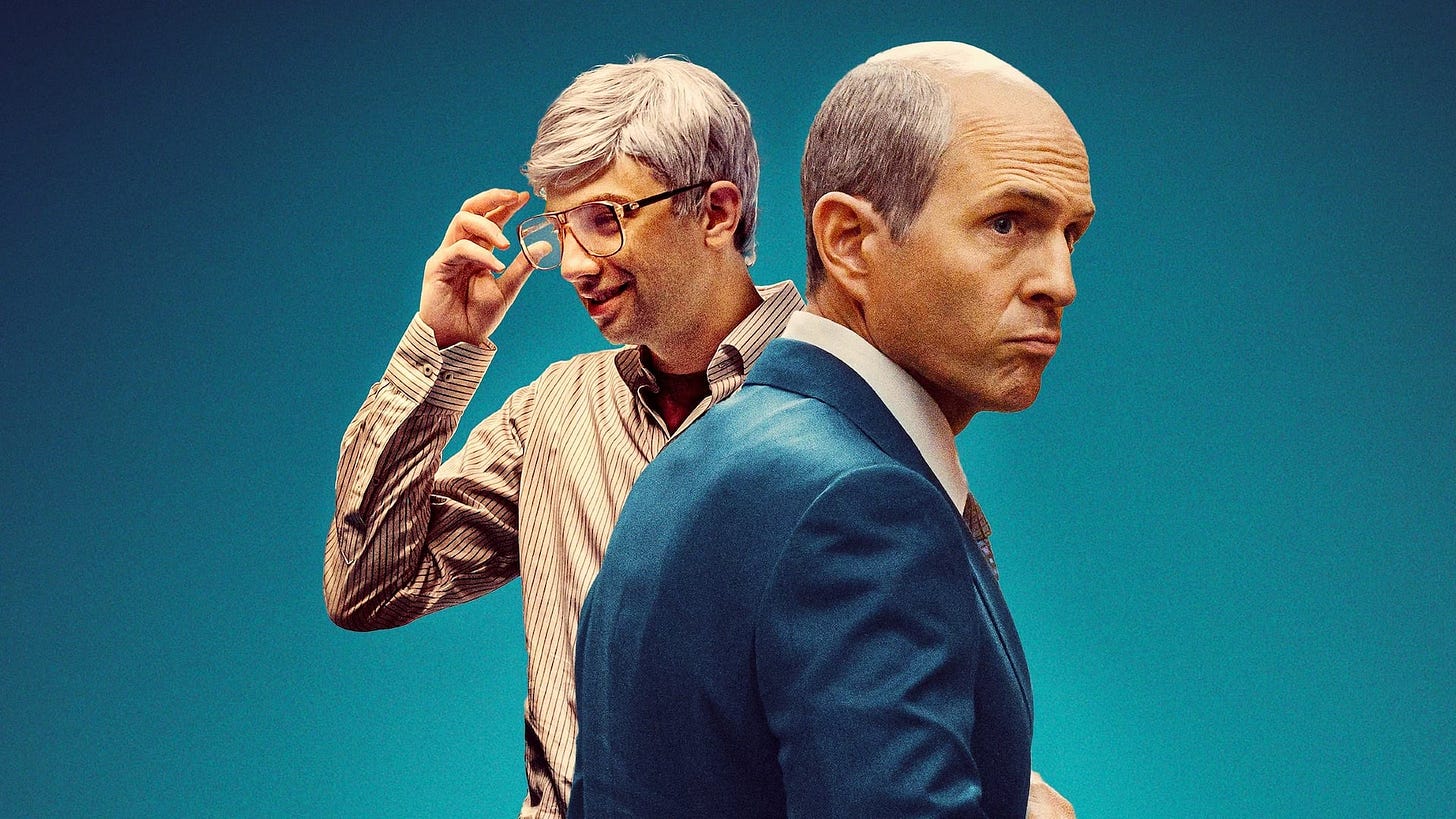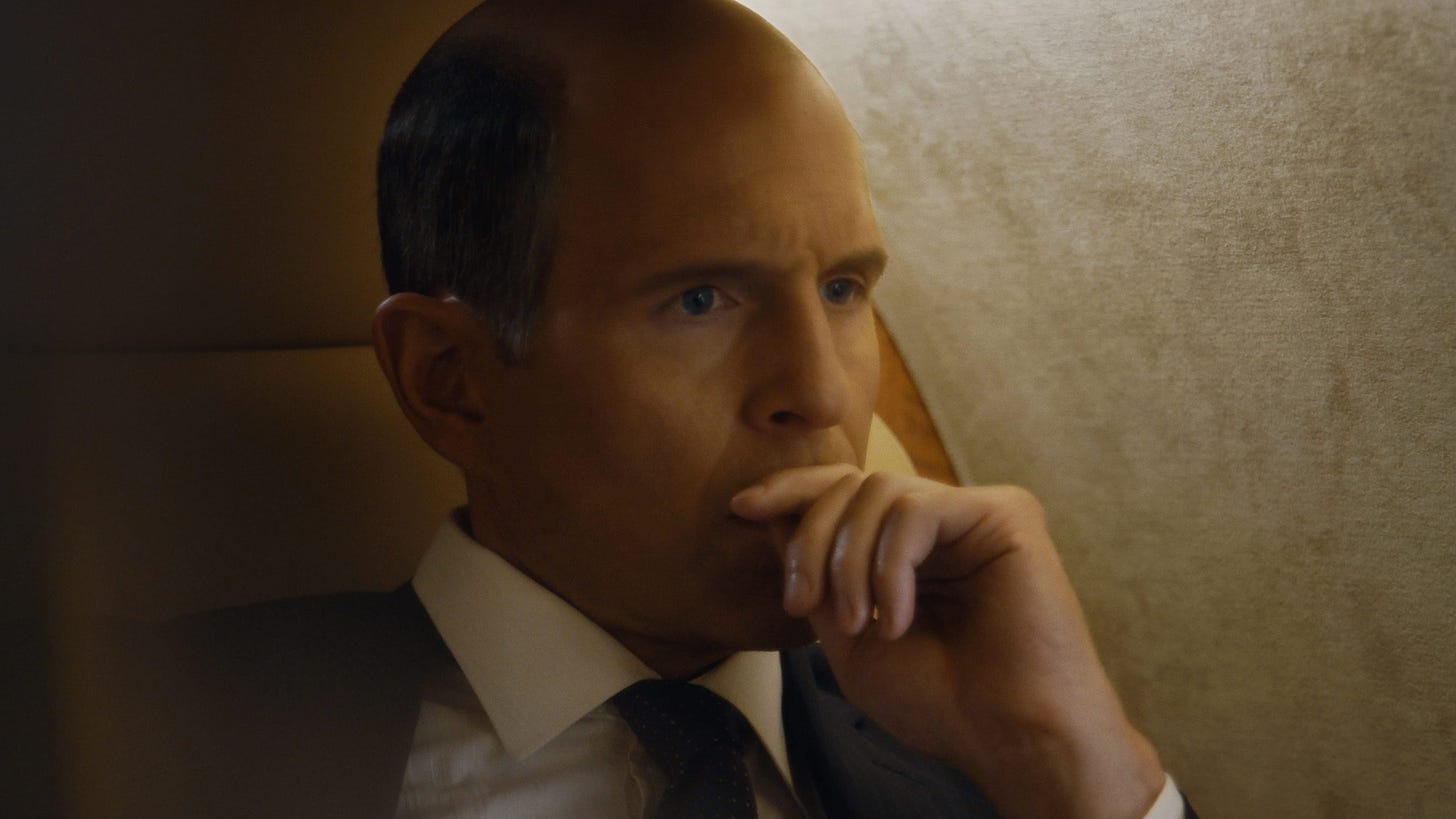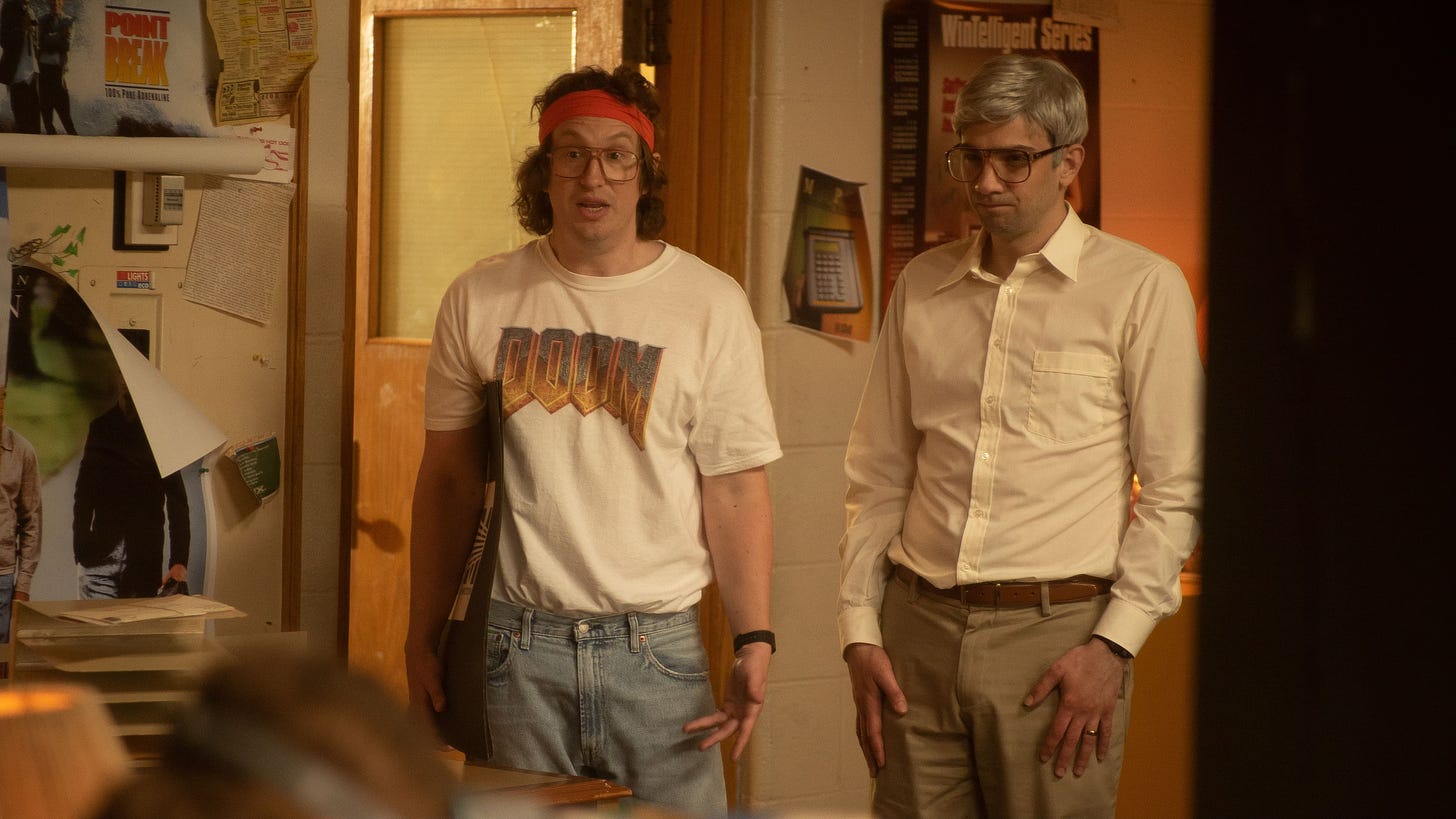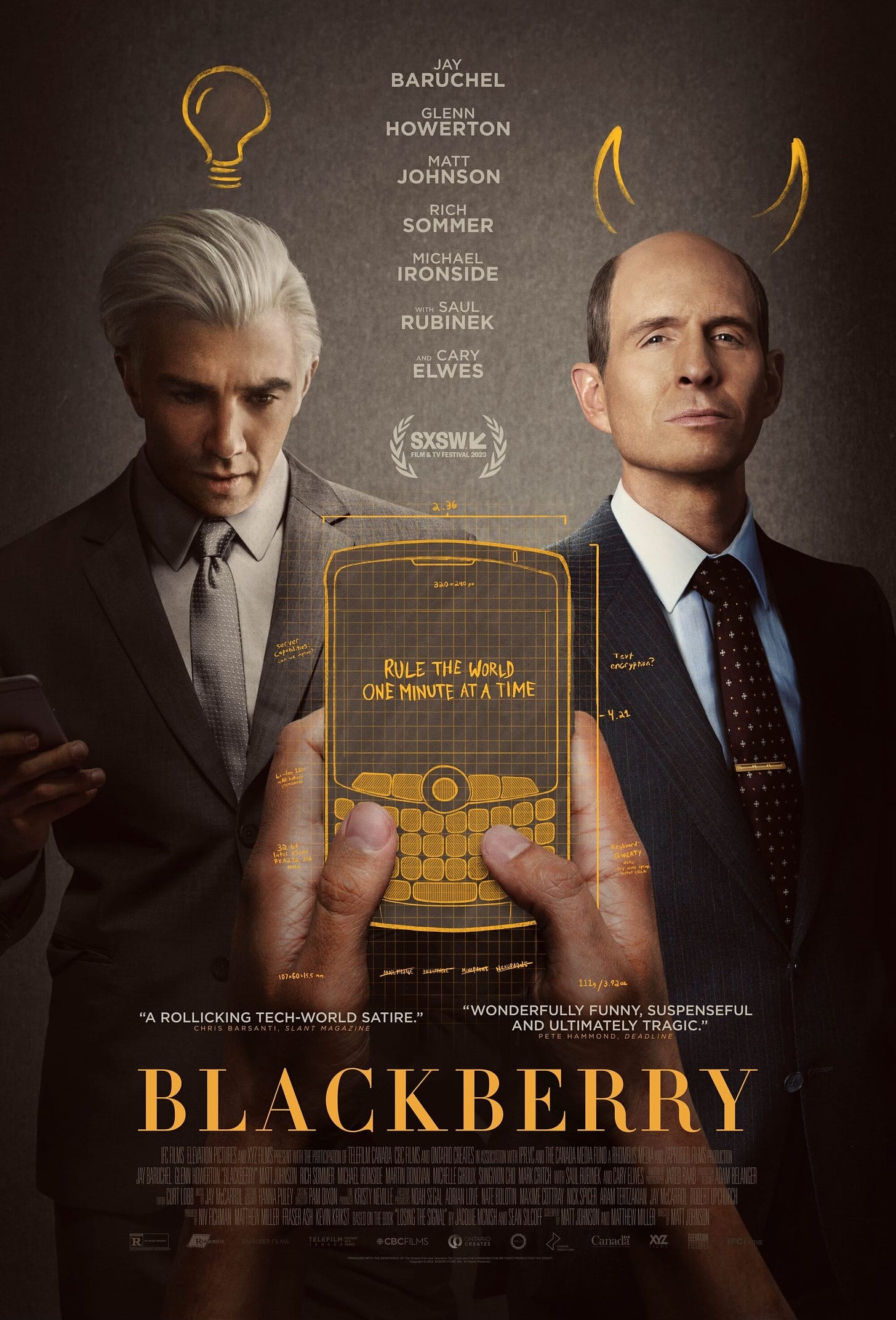BlackBerry's Ode to Corporate Competence
Matt Johnson's latest film isn't the anti-capitalist fable some think it is

I watched the excellent BlackBerry on Friday with THE COMPANION (👩) (her review: “quick”) and THE CAT (🐈) (who remained noncommittal).
Read on for a discussion of the movie’s central tension, why it is the anti-The Social Network, and why the dominant take on the movie is… wrong (*hushed gasps*)
“We are going to go from ‘number one phone in the world’ to ‘that phone that people had before they bought an iPhone.’”
BlackBerry is a cradle-to-grave, rise-and-fall biopic with a twist: its subject isn’t a singer, politician or tech founder, but a product.
That product? THE BLACKBERRY, presciently described by a character as “that phone that people had before they bought an iPhone.”
Mike Lazaridis (an entertaining, if occasionally over-affected, performance from Jay Baruchel) and Doug Fregin (played by BlackBerry’s director, Matt Johnson) are two endearing nerds with a surplus of smarts and a shortage of social skills and business savvy.
Co-founders of the amateur-hour tech company Research In Motion, or RIM for short (yes, that’s real), the film kicks off with Mike & Doug’s calamitous attempt to pitch their clumsily named “PocketLink” device to an anonymous Big Scary Corporate Company (👹).
Despite the pitch’s failure, it places RIM in the crosshairs of Glenn Howerton’s Jim Balsillie (yes, that’s also real). Jim is a ruthless Gordon Gekko wannabe with zero (🙅♂️) tech knowledge but an abundance of the bloodthirsty killer instinct (🔪) Mike & Doug’s geeksquad lacks.
Sensing an opportunity, Jim engineers himself the co-CEO position and a sizeable shareholding in RIM, and together, the trio embark on their mission to put a computer in the pocket of every American.

“I just mortgaged my house to pay our staff. So, if this doesn’t work out, I’m fucked.”
At the film's heart lie three competing visions for the BlackBerry’s future.
Howerton, known for playing the psychopathic Dennis Reynolds in It’s Always Sunny in Philadelphia, is perfectly cast as Jim, a man prone to explosions of white-hot rage, phone-smashing temper-tantrums, and deliciously vainglorious quips like “thirst is a display of weakness.” (🚰⛔)
Jim isn’t just a reheated Dennis. Howerton allows subtle moments of pathos to slip through the cracks, such as a despairing whisper of “It won’t work” to Greg during a tumultuous early boardroom scene. He’s not so much imperiously delusional as he is desperate for validation and success, admitting to Greg that “I just mortgaged my house to pay our staff. So, if this doesn’t work out, I’m fucked.”
Jim’s desperation manifests in a myopic focus on profits and growth at all costs, something anathema to the whimsical, anarchic spirit of Johnson’s Doug, who is the co-founder of RIM but has no management position. A capital N-Nerd who loves Teenage Mutant Ninja Turtles (🐢), Doug represents RIM’s soul: innocent, youthful, and fun-loving.
Doug serves as the Yin to Jim’s Yang. While Jim is perpetually in a suit, Doug nearly always rocks movie-branded-merch. Where Doug boasts long, flowing hair, Jim sports a monk-like balding head. To Jim, RIM’s culture is something to be dominated and transformed; to Doug, it’s sacrosanct. He is appalled when management tries to disrupt their hallowed movie night (🍿) and views Jim’s corporate machinations as an existential threat to the company.
Despite their differences, Doug and Jim are similarly steadfast in their beliefs and equally determined to try and bend the hapless Greg to their will.
Caught in the middle is co-founder and co-CEO Greg. A tinkerer and a perfectionist, his North Star is that “good enough is the enemy of humanity,” a mindset that manifests primarily in his refusal to shift production to China. As the story progresses, Greg increasingly heeds Jim’s advice, leading him down a path of Zuckerberg-style moral decline, an arc that, while never totally persuasive, is given a wonderful denouement in the film’s final scene.

The shadow of Mark Zuckerberg, or more particularly, The Social Network, looms large over BlackBerry.
The film sits firmly in the lineage of slick, snappy, melodramatic cautionary corporate fables that started with The Social Network and accelerated with The Big Short. These purportedly anti-system morality tales have become a genre unto themselves in recent years, often eye-rollingly so given the big-money studios lurking behind them (in 2023 alone, we saw the release of BlackBerry, Tetris, Air, Dumb Money and Pain Hustlers (🤑💸🫰).)
BlackBerry is a reminder of just how entertaining these stories can be when used not as a formulaic revenue generator but as playgrounds for directors to explore their own ideas and peccadilloes. Just as Mark Zuckerberg’s calculated intensity and guarded persona were a perfect fit for David Fincher’s icy cold interiority, so the inherent absurdity of the BlackBerry’s story lends itself perfectly to Johnson’s fleet-footed, freewheeling style.
Despite its superficial resemblances with The Social Network, under the hood, BlackBerry is a different beast.
Matt Johnson, often dubbed a 'guerrilla' filmmaker due to his penchant for low-budget, mockumentary, and experimental styles, infuses BlackBerry with his signature touch; from the handheld camera work (an early scene of Jim confronting his boss is shot partially through the boardroom window), to the loose-feeling dialogue and grainy aesthetic.
There are hints of Trent Reznor & Atticus Ross’ throbbing The Social Network score in Jay McCaroll’s original soundtrack. These are punctuated by a series of crowd-pleasing needle drops, including a wonderful Moby-set montage and an on-the-nose but 🤌 final song.
Cinematographer Jared Raab captures the film’s ethos in a Blu-ray extras clip:
“we extensively talked about the look of the movie and what we want the movie to look like and feel like and how alive we want it to be feeling like we're catching a glimpse into meetings that we were not supposed to be there and this kind of idea that everything that you're seeing on camera feels like even the people shooting it can't believe that they're there at the time.”
In this sense, BlackBerry more closely resembles Succession, The Thick of It, and The Office than it does the austere precision of The Social Network.
The films differ in subject as well as style. The Social Network was more about Zuckerberg than Facebook, presenting an operatic dissection of the corruption of the soul. BlackBerry, for the most part, avoids such introspection. Although Jim and Greg, in particular, are given moral arcs, these are largely played out as farce rather than tragedy and are ultimately detached from the BlackBerry’s eventual fate.
Speaking of which…
“I’m from Waterloo, where the vampires hang out.”
The prevalent interpretation of BlackBerry is as a nerd-friendly fable and anti-big business cautionary tale. This perspective views the film as a story of lovable tech nerds allowing the innocent, childish joy of experimentation (🎉) to get sullied by the poisonous influence of corporate pirates focused only on profits (🏴☠️). To drive the point home, a memorable scene features a big, old, scary-looking man in a suit telling a room full of terrified-looking twenty-somethings that they are “children” who he will keep firing until “the room is full of men and not little boys.”
This reading of the film sees Howerton’s Jim as a vampiric creature (🧛♂️), a parasite who latches onto the vulnerable young founders and bleeds the company for profits and prestige (Jim does, to be fair, outright declare at one stage: “I’M FROM WATERLOO, WHERE THE VAMPIRES HANG OUT!”)
The film’s marketing leans into this interpretation - one poster fronts the BlackBerry, with an innocent-looking Greg on one shoulder and a pouting Jim, sporting devil horns, on the other:

Johnson acknowledges that Jim is more nuanced in an interview with Maclean’s:
“In my opinion, Jim Balsillie is portrayed in this movie as being very kind. At no point is he sadistic. Deep down, all he wants is to be the best. Of course, he’s totally misguided. Without a Mike or a Doug, the Jim personality type is heartless […] It’s more Jim’s attitude: if it’s going to benefit their company, anything is justified.”
I’d take it a little further. Unlikeable though Jim may be as a person, on the film’s terms, he is singularly instrumental to the BlackBerry’s success. Towards the end, a series of funny bits show Greg trying to cosplay Steve Jobs. However, it’s Jim who imposes the most Jobsian influence on the company. His ability to bribe, bully and inspire RIM’s employees (evoking Jobs’ ‘reality distortion field’) leads to them achieving seemingly impossible aims. Earlier in the film, it’s made clear that had it not been for Jim’s intervention, RIM would likely have never built the BlackBerry at all.
Doug, on the other hand, is pretty much useless. He gives bad advice and is not shown meaningfully contributing to RIM’s success. Two examples taken from early in the film’s script suggest that this is intentional (emphasis added):
MIKE
I think it’s like, something kind of like a hybrid of one. So, I like the look of--
Doug is distracted looking at two different TMNT figurines.Mike, still awake, opens the blinds revealing the early morning sun and Jim waiting outside his BMW. Jim honks again.
Doug rolls over to see what Mike did while he was asleep -- his eyes light up -- he picks up THE PROTOTYPEThe film hints that Doug plays a sort of conduit role between upper management and the workers (Johnson described him as a "kind of mascot figure who is tying the culture of the office together,") but we’re never shown this having any meaningful effect.
The narrative that Jim’s influence led RIM to ruin isn’t what’s shown on the screen. The fall of the BlackBerry is presented as a result not of arrogance or corporate mismanagement but of intense market competition heralded by the arrival of the iPhone (📱). Yes, both Jim and Greg ultimately become victims of hubris (and the unwelcome attention of the US Government), but ultimately, BlackBerry was beaten by a superior product, a fact tacitly acknowledged by Greg's emulation of Steve Jobs.
The question we’re left with, therefore, is what would it have taken to beat Apple: More Jim, or more Doug? The answer, perhaps, lies in Jobs himself: half-countercultural idealist, half ruthless autocrat, he is in many ways a combination of the two, a combination that Greg tries and fails to live up to.
In this way, despite its anarchic sensibilities and Johnson’s ‘fuck the system’ aesthetic, BlackBerry isn’t so much an anti-corporate warning as it is a sad, resigned demonstration of just what it takes to transform an innocent idea into something that truly makes a mark on the world.




Now that I've seen the film I can read this!